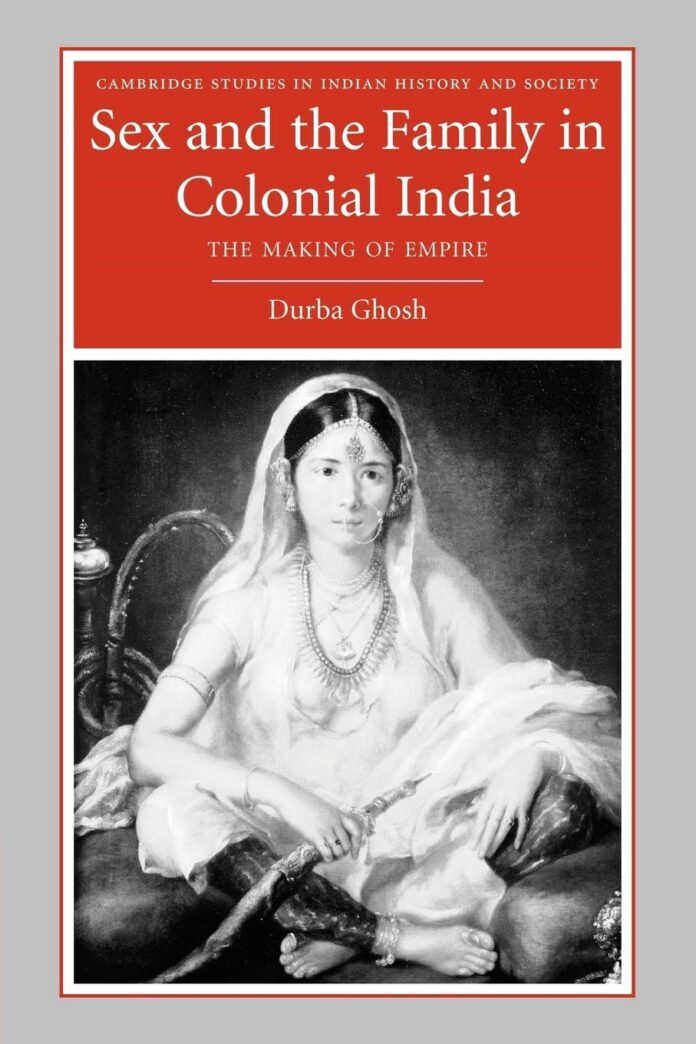
Sex and the Family in Colonial India: The Making of Empire (Cambridge Studies in Indian History and Society, Series Number 13)
by Tahsina Nasir 30 May 2024
Durba Ghosh’s Sex and the Family in Colonial India: The Making of Empire presents a groundbreaking examination of the intimate relationships between British men and Indian women during the colonial period. Drawing on extensive archival research, Ghosh offers a nuanced understanding of these relationships, challenging traditional narratives of colonial power dynamics. The book is structured methodically, with chapters dedicated to different aspects of colonial intimacy and its implications for gender, race, and power in South Asia. Ghosh’s interdisciplinary approach combines historical analysis with insights from gender studies and colonialism, enriching our understanding of the complex interplay between personal relationships and broader historical forces. Each chapter builds upon the previous one, offering a comprehensive exploration of colonial intimacy and its lasting impact on South Asian society.
Ghosh’s research method is meticulous, relying on a wide range of archival sources to reconstruct the intricacies of colonial relationships. From British publications and legal documents to personal correspondences and post-death wills, Ghosh leaves no stone unturned in her quest to uncover the emotional and social dimensions of colonial encounters. Each chapter of the book delves into a different aspect of these relationships, from the negotiations of power and agency to the implications for colonial society. Ghosh’s interdisciplinary approach allows her to situate these relationships within broader historical contexts, shedding light on their significance for understanding colonial governance and its legacies.
Ghosh argues that colonial administrators were not immune to the allure of sensual and intimate relationships with Indian women. These relationships were marked by negotiations of power, agency, and racial dynamics, reflecting broader societal anxieties and contradictions. Ghosh’s examination of British publications, legal documents, and personal correspondences reveals a spectrum of relationships ranging from genuine affection to exploitation and conflict. One of the key insights from Ghosh’s research is the concept of “racial anxiety” that permeated British colonial rule. This anxiety stemmed from the disparity between British self-perceived moral and racial superiority and the reality of engaging with a culturally rich and materially prosperous Indian society. The British East India Company and later imperial authorities attempted to erase or obscure evidence of these relationships to maintain the veneer of racial purity and moral authority.
Ghosh’s exploration of colonial relationships also highlights the paternalistic attitudes of the colonial state. Both the British and earlier Mughal empires exercised paternalism to reinforce gender hierarchies and control over women. Ghosh demonstrates how British men sought to legitimize their mixed-race offspring while denying legal and social recognition to the children’s mothers, perpetuating gender and racial biases. The book provides a compelling analysis of the impact of these relationships on colonial society. Mixed-race children were typically treated as colonial subjects rather than British citizens, with significant implications for their rights and social standing. Ghosh’s research reveals the various strategies employed by colonial authorities to manage these children and their mothers, including separating them at an early age and erasing maternal identity.
Contemporary injustices against women and other marginalized genders in South Asia can be understood through the historical roots of colonialism and gender oppression. Ghosh’s work provides vital context for understanding these modern struggles, demonstrating how colonial legacies continue to shape societal norms and legal practices. The systemic undervaluation of women’s experiences and the struggle for justice and recognition reflect enduring inequalities rooted in colonial power dynamics. Another major contribution of this project lies in the book’s reevaluation of traditional sources and narratives of South Asian history. By focusing on family relationships, Ghosh offers a unique perspective that challenges conventional historiographies. Rather than relying solely on official records and political documents, Ghosh demonstrates how personal relationships can serve as valuable sources for understanding broader historical processes. This innovative approach not only enriches our understanding of colonialism but also offers new insights into the complexities of South Asian society.
Specifically, Ghosh’s analysis of how local women navigated their constrained circumstances adds a vital dimension to the study of colonial history. By examining the ways in which women negotiated small but significant victories within the colonial system, Ghosh sheds light on their agency and resilience in the face of oppression. Her interdisciplinary approach connects historical analysis with broader themes in gender studies and colonialism, making this work essential reading for scholars and students alike.
In post-colonial history, research on topics such as sex, family, or domestic relationships has been relatively limited, with exceptions like the studies conducted by scholars such as Indrani Chatterjee or William Dalrymple. In fact, these subjects have not been widely considered as viable avenues for enhancing our comprehension of colonial governance. Nevertheless, the intricate dynamics of Andaramahal present a potentially novel and compelling source for elucidating post-colonial history. Therefore, Ghosh’s Sex and the Family in Colonial India: The Making of Empire is a groundbreaking study that offers new insights into the complexities of colonial relationships. Through her nuanced analysis, Ghosh challenges existing historiographies and opens up new avenues for understanding the intersections of sex, power, and race in colonial India. Her work contributes to a deeper understanding of colonialism’s lasting impact on gender relations in South Asia and its relevance to contemporary struggles for gender justice and equality.

